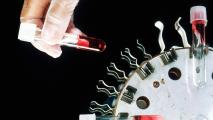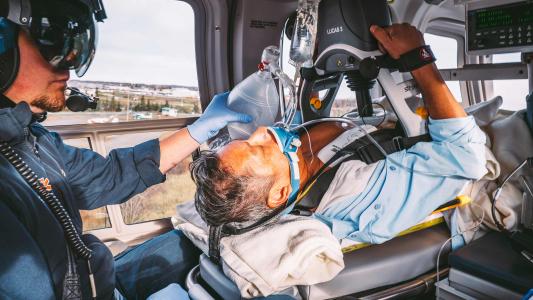University of Pittsburgh researchers have tested a promising treatment for COVID-19, based on a nanobody found in the blood of a llama — and it can be inhaled straight into the lungs.
“COVID-19 is now a preeminent disease of the 21st century,” Doug Reed, co-author of the new study, said in a press release. “Delivering the treatment directly to the lungs can make a big difference for our ability to treat it.”
The challenge: When a virus infects the body for the first time, the immune system creates blood proteins called antibodies that will bind to the virus; if the same virus ever turns up again, antibodies can disable it and trigger the immune system to attack.
Monoclonal antibodies are lab-made antibodies designed to treat various diseases. They’ve been used successfully against some cancers, MS, and, most recently, COVID-19.
But while monoclonal antibody treatments appear effective, they’re expensive, difficult to produce, and must be administered via injection. By the time people end up in the hospital, where they can get the IV drug, it’s often less effective than if they’d gotten it earlier.
Thinking small: Nanobodies are a smaller type of antibody found in alpacas, llamas, and other camelids. They can be used to treat diseases, and they are cheaper and easier to produce than monoclonal antibodies.
It’s also possible to administer nanobodies via an aerosol, which can be especially useful when treating respiratory infections.
“By using an inhalation therapy that can be directly administered to the infection site — the respiratory tract and lungs — we can make treatments more efficient,” co-senior author Yi Shi said.
Inhaled nanobodies: In 2020, Shi and his colleagues identified more than 8,000 nanobodies against the coronavirus behind COVID-19 in the blood of an immunized llama named Wally.
They then tweaked a particularly potent nanobody in the lab to maximize its ability to combat COVID-19, calling their final creation the Pittsburgh inhalable Nanobody-21 (PiN-21).
The inhaled nanobodies reduced the virus particles in the hamsters’ lungs by a million-fold.
Testing the treatment: When PiN-21 was inhaled by hamsters with COVID-19, the treated rodents experienced less inflammation and milder changes in their lung structure than animals in the placebo group.
They didn’t lose any weight, either, while untreated hamsters lost 16% of their body weight in one week.
The inhaled nanobodies also reduced the number of virus particles in the hamsters’ nasal cavities, throats, and lungs by a million-fold — this suggests it might be able to help prevent the spread of COVID-19 between people.
The next steps: So far, PiN-21 has only been tested in animals, so we don’t know what effect it might have in humans.
However, this is the first time anyone has tested the ability of inhaled nanobodies to treat COVID-19 in a living creature, and the promising results of the study suggest that more research is warranted.
“We are very excited and encouraged by our data suggesting that PiN-21 can be highly protective against severe disease and can potentially prevent human-to-human viral transmission,” Shi said.
We’d love to hear from you! If you have a comment about this article or if you have a tip for a future Freethink story, please email us at tips@freethink.com.






